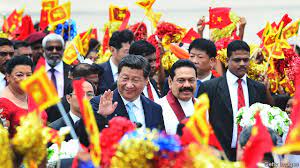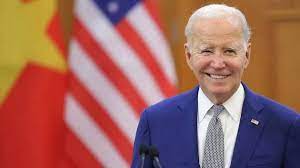Opinion: As the world becomes cautious of expansionism and the debt trap, Xi Jinping’s China stands alone
A deeper examination of world geopolitics throughout time reveals that China, which was isolated until the end of the 1990s, strove to play a more aggressive role. This is also seen from its advanced economy and military capabilities.
Beijing has attempted to subjugate the nations of Europe and Asia throughout the years by launching large-scale initiatives like One Belt One Road (OBOR). The Chinese leadership similarly showed a significant interest in expanding its influence in distant Latin American and African nations. In terms of economic growth, China went from having an undeveloped economy to having the second-largest economy in the world in a relatively short amount of time.
The geopolitics of the world have undoubtedly been impacted by all of these occurrences. This is clear from the fact that many American businesses have relocated to China, which has caused many scholars and officials to forecast a bright future for China.
Such a hopeful image, however, was only fleeting, and in recent years, Chinese dominance has significantly decreased in the global geopolitical arena. China will eventually become more marginalized in global geopolitics if this pattern continues. The same may be examined via the prisms listed below.
The post-Covid global order and China
A deeper examination of China’s development during the last two years reveals several danger zones in its growth trajectories. Its expanding presence is also making many very nervous about world geopolitics. The emergence of Covid-19, which had a disastrous effect on world geopolitics, made this more blatantly obvious.
According to a number of stories, the Covid-19 virus first surfaced at a laboratory in Wuhan, China, in this context. It has also been linked in some publications to China’s hybrid warfare tactics. In the economical and political areas of international geopolitics, Covid-19’s terrible effects are still being felt. Covid-19 not only hampered the world’s supply chain but also made the health situation more precarious.
The international community is becoming more concerned about China’s motivations and intentions in the post-Covid era. China now finds itself at a competitive disadvantage in world geopolitics.
Global geopolitics and China’s isolation
China’s aggressive actions in the Indo-Pacific area are another indication of its rising marginalization in world geopolitics. China has developed its strategic theories throughout time while keeping in mind its bold geopolitical actions. In this respect, it is important to emphasize that “international strategic competition is on the rise,” as stated in China’s National Defense in the New Era, which was released in 2019. In the same report, Chinese planners emphasize that Xi Jinping’s “Chinese dream” may be realized through “seizing the strategic commanding heights in military competition.”
Over the years, China has used advanced, high-tech weaponry to threaten its neighbors and showcase its military might. For instance, according to current statistics data from the SIPRI Year Book, “China stocked a total of 410 nuclear warheads in 2023, 60 more than the number in 2022.” The yearbook also emphasized how China’s long-range ICBM is fitted with nuclear warheads, endangering international security.
According to a research by the Washington-based Centre for Strategic and International Security (CSIS), the Chinese Navy has more ships than the 287 ships in the US Navy. In this respect, it is important to emphasize that the Chinese Navy’s increasing militarization will present a serious threat to the security of the Indo-Pacific region, which encompasses the South China Sea, East China Sea, Taiwan Straits, and other areas. Similar to this, China’s String of Pearls plan to control the Indian Ocean results in an overly militarized region, endangering the stability and security of the nations that make up the Indian Ocean’s coastline. The Global Security Initiative Concept Paper, which was released in February 2023, recently articulated the philosophy, which is another sign of China’s intention to strengthen its military might globally.
A deeper examination of Chinese military mobility only results in negative outcomes for China. For instance, the ASEAN nations, with the exception of Cambodia, are horrified by China’s military adventurism. Similar to this, Quad has complained about China’s military overtures at different summit gatherings. The spiraling social problems among the local populations and the Chinese employees who are employed on numerous Chinese projects in Africa are another indication of the continent’s rising animosity towards China.
Similar to this, China’s aggressive illicit geopolitical cartography revealed Beijing’s sinister intentions. India, the Philippines, Malaysia, Vietnam, and Japan all protested as a consequence. As a result of China’s illegitimate land possession, demonstrations have grown throughout Siberia and the Far-East regions of Russia, as well as Central Asia (Kazakhstan, Kyrgyzstan, and Tajikistan). Local groups are increasingly protesting China for its land- and resource-grabbing practices even in Latin America. China is really excluding itself from regional and international geopolitics by engaging in such nefarious behavior. China has acquired the reputation of being a danger to international stability throughout time.
The unsuccessful global geoeconomic policies of China
Geoeconomic boundaries are the third area in which China is isolating itself. China’s geopolitical nimbleness is solely intended to achieve total supremacy in world commerce. Some geoeconomic initiatives, including as the One Belt and One Road (OBOR) initiative, seek to completely dominate world commerce.
In the framework of global geopolitics, China has three main goals for its geoeconomic strands. The first is to control resources, such as vital minerals and energy, and convey them to China. Second, for China to succeed in this, she must completely control all land and maritime trade channels. China also requires the international market in order to export its final goods. Third, China also engages in debt diplomacy, which involves giving loans to nations in a way that renders them susceptible to external pressures and plunges them into long-term crises. Due to China’s debt trap, several nations in Asia, Africa, and Latin America declared bankruptcy.
One may use Sri Lanka, Pakistan, Central Asian nations, Mongolia, Djibouti, Sudan, and Kenya as instances of debt problems brought on by China, to mention a few. Many of these nations borrowed money from China but didn’t pay it back, which resulted in debt buildup. China seized control of these nations’ resources and strategic assets by taking advantage of the financial crisis. Examples of this include China’s attempt to seize control of the strategically significant Gwadar Port in Pakistan or Sri Lanka’s attempt to lease the strategically important Hambantota port after the Sri Lankan government failed to repay a loan estimated to be worth $7.54 billion.
Similar to this, China used a debt trap to seize control of the natural resources in Mongolia and Central Asia. Sooner or later, Russia is anticipated to pay the price for China’s debt. Without understanding the risks, Moscow is accepting significant sums of financial help. You may remember that throughout the years, international financial organizations have issued warnings about the dangers of China’s debt trap.
It is widely accepted that trade corridors—both land and sea—play a crucial role in fostering global commerce, which is advantageous to humanity. However, China’s Maritime Silk Road Project and OBOR diplomacy have backfired, and there is rising opposition to these two schemes throughout the globe. By examining the countries that have participated in this project, one can summarize some of the major adverse effects, including harm to the domestic economy, severe environmental effects, an increasing influence of China in domestic political processes, harm to domestic industries, etc.
China’s supremacy in terms of strategy is the outcome of the OBOR nations’ increasing dependency on one another and the emergence of a patron-client relationship. Additionally, it has been noted that there has been a sharp increase in public protests against OBOR projects in a number of nations, which has accentuated social unrest. The same may be seen in several locations throughout the globe. Additionally, it may be said that the Maritime Silk Road and OBOR projects are nothing more than ways to expand a country’s geopolitical sphere of influence in Asia, Africa, and Europe. Even the nations of Europe are exercising caution.
Here, it is important to draw attention to a study by the European Parliament titled “Towards a Joint Western Alternative to the Belt and Road Initiative.” The risk that BRI projects will produce subpar economic returns, adverse environmental and social impacts, or even be useless “white elephants” is increased by the absence, nondisclosure, or poor quality of impact assessments on economic viability, environmental and social sustainability, and human rights. BRI projects often come in over budget because to the lack of competition. They are especially prone to supporting or encouraging corruption and nepotism because of their opacity.
As a result, in their early years, the OBOR and the Maritime Silk Road received a lot of attention. It first caused a lot of trepidation among the nations who joined it. In this regard, it is important to note that China’s geopolitical overture is generating great concern in international geopolitics by cutting itself off from the world economy.
China’s domestic economy is deteriorating
The second-largest economy in the world is now China, although throughout time, particularly in the post-Covid period, China has slipped in the rankings. Inflation has increased, the industrial sector has slowed down from its strong growth rate, and unemployment has skyrocketed.
China is also exporting less industrial goods to the global market at the same time. According to a recent CNBC report, exports from China to the global market decreased by 14.5% in July 2023 as compared to the global market. According to the same data, shipments to the United States fell by around 23.1% in July 2023 compared to the previous year. Given that the United States is China’s top export market, this loss is concerning and might seriously threaten the Chinese economy’s future.
Foreign investors were discouraged from making investments in China due to the official behavior of the Communist Party of China (CPC). The already fragile Chinese economy is made worse by the sharp fall in foreign direct investment. For instance, according to Bloomberg, FDI decreased by $4. 9 billion, a significant decrease over the previous 25 years.
Questions about the status of the Chinese political economy have also been raised by the periodic disappearances of Chinese millionaires from China. Also prohibited from operating freely in China are businesspeople due to the CPC’s totalitarian leadership and its oppressive regulations. The Chinese economy’s development is really hampered by this. It has been noted that private business owners, together with the state, play a significant part in boosting the domestic political economy. On the other hand, long-term political-economic growth in China may be hampered by the lack of private participants in the country’s economy. China will be at a disadvantage in the globalized economy as a result.
Unholy alliance between China and Pakistan, Turkey, and Qatar
The fact that China has formed an unholy alliance with Pakistan, Turkey, and Qatar over the years and begun to support extremist and terrorist movements is another significant factor isolating China in international affairs.
China has defended Pakistan on many times in multilateral organizations like the UN for its conduct of aiding terrorism. Beijing never criticizes Islamabad for aiding and harboring terrorist groups in order to further its own geopolitical objectives. State-sponsored terrorism is undoubtedly a concern for Pakistan’s foreign policy. Similar to Turkey, China is ignoring Erdogan’s government’s strategy of supporting extremism and terrorism, which is raising security worries throughout the globe.
In order to realize its own geopolitical objectives, such as the operationalization of its much-hyped OBOR project to Europe via Turkey, China keeps the Erdogan dictatorship of Turkey in good humor. In a similar vein, China maintains good relations with Qatar despite the fact that it sponsors terrorism in order to protect its oil interests. China is now becoming more involved with Turkey, Pakistan, and Qatar, which distances it from the rest of the world.
China’s lack of participation in international normative discourse
A deeper examination of China’s emergence shows that, despite its claims to be a major global power—more so since the start of the twenty-first century—the country has clearly increased its economic might but has not made a significant contribution to the development of moral idioms in global geopolitics. This is one of China’s interaction with the world’s weakest connections.
At the same time, the world community is very wary of certain of China’s imperial normative idioms, such as Middle Kingdom Complex, which serves as the foundation for China’s current foreign policy. In a similar vein, the Confucius Centers that China constructed across the world to portray its image have mainly also failed. There is an increasing opposition in the many nations where China’s cultural center is located since these centers are genuinely eradicating local culture and language.
Anger against China is evident from the recent uptick in uprisings throughout Central Asia and Africa. As a result, China has significantly distanced itself from the rest of the world as a normative force. If one thoroughly examines China’s stance on topics like climate change, the transition to a renewable energy source, and other normative concerns, one would see that it adopts an ad hoc stance that harms the interests of the Global South.
Despite its development, China has alienated many people.
In conclusion, China has significantly advanced over the last several years, but it has also significantly cut itself off from world processes. Beijing still needs to build up its reputation among world leaders. China has throughout the years shown considerable economic strength, although this has been waning recently.
China has also been embroiled in acrimonious conflicts with its neighbors over both territorial issues and water rights. The issue of water sharing and territorial conflicts has sparked a ferocious struggle between China and the whole region of South East Asian, South Asian, and Central Asian nations. Over the last several years, China has further distanced itself with its aggressive, malevolent cartographic geopolitics.







